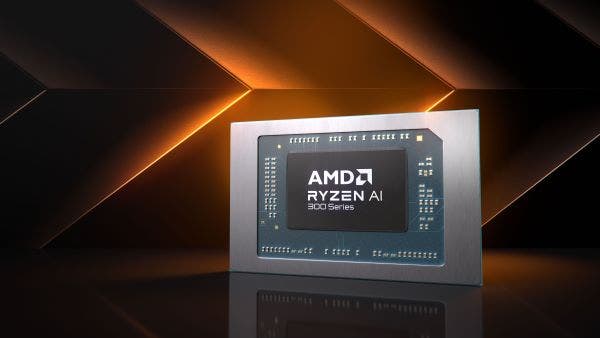AMD’s Ryzen AI 300 Chips For Copilot+ PCs Take Aim At Qualcomm, Apple And Intel
by nlqip

The chip designer claims that its forthcoming Ryzen AI 300 mobile processors for Windows Copilot+ PCs can outperform its rivals’ chips in NPU performance, large language model performance, productivity, graphics, multitasking, video editing and 3-D rendering.
AMD has revealed its third generation of Ryzen processors for AI PCs with a new brand name, claiming that they beat the latest chips from Intel, Apple and Qualcomm.
The Santa Clara, Calif.-based company showed off the new processors, called the Ryzen AI 300 series, at Computex 2024 in Taiwan on Monday and called them the “world’s best” for PCs that are part of Microsoft’s new Copilot+ PC program.
[Related: AMD’s David McAfee On Why AI PCs Are ‘Here To Stay’ And Why ISVs Will Flock To The NPU]
“We are excited to partner with AMD to deliver these new Ryzen AI-powered Copilot+ PCs,” said Microsoft CEO and Chairman Satya Nadella in a statement. “We are very committed to our collaboration with AMD and we’ll continue to push AI progress forward together across the cloud and edge to bring new value to our joint customers.”
The announcement was made roughly two weeks after Microsoft revealed the first wave of Copilot+ PCs, which come with exclusive AI features like Recall for Windows 11 that take advantage of the device’s processor, namely its neural processing unit (NPU).
Qualcomm beat AMD and Intel to become the first chip company to power Copilot+ PCs with its Snapdragon X processors, saying that they will deliver “industry-leading performance” when the 20-plus laptops powered by its chips land in June.
Now AMD is hitting back against Qualcomm and taking digs at Intel and Apple too with claims that the Ryzen AI 300 series—the successor to the Ryzen 8040 series that launched in December—can outperform its rivals’ chips in NPU performance, large language model performance, productivity, graphics, multitasking, video editing and 3-D rendering.
The company said the Ryzen AI 300 processors will go into more than 100 PCs, including laptops, starting in July, from Dell Technologies, HP Inc., Lenovo, MSI, Acer and Asus.
At launch, the lineup will consist of the 12-core Ryzen AI 9 HX 370, which has a maximum boost frequency of 5.1GHz, and the 10-core Ryzen AI 9 HX 365, which boosts to 5GHz. Both have a base thermal design power of 28 watts, which can be configured down to 15 watts for more efficient designs and up to 54 watts for higher-performance designs by OEMs.
The processors use AMD’s Zen 5 CPU architecture, RDNA 3.5 GPU architecture and XDNA 2 NPU architecture, the latter of which is capable of 50 tera operations per second (TOPs).
With TOPS becoming a key measurement for AI performance in a PC, AMD said Ryzen AI 300’s 50 TOPS performance puts the series above the 45 TOPS touted for Qualcomm’s Snapdragon X chips and the 40-45 TOPS anticipated for Intel’s forthcoming next-generation Core Ultra processors, code-named Lunar Lake.
The NPU performance is also above that of Apple’s M4 system-on-chip, whose Neural Engine can crank out 38 TOPS and debuted in the new iPad Pro last month.
When it comes to performance for running inference on a large language model—the 7-billion-parameter Llama 2 model in this case—AMD said the Ryzen AI 9 HX 370 is five times faster than Intel’s Core Ultra 7 155H that debuted in December.
To improve AI performance, AMD said XDNA 2 is using a new data format called Block FP16, which is short for 16-bit floating-point math. The format combines the performance of a lower-precision 8-bit format like INT8 with the higher-accuracy FP16 format.
The company reiterated previous statements that it is working with more than 150 independent software vendors on AI-powered applications that will launch this year and take advantage of AMD’s Ryzen AI processors for PCs.
When it comes to more standard PC benchmarks, AMD shared charts showing that the Ryzen AI 300 series can outperform Qualcomm’s Snapdragon X Elite, Apple’s M3, Intel’s Core Ultra 185H processors by single- or double-digit percentages.
Against the Snapdragon X Elite, AMD said, the Ryzen AI 9 HX 370 is 5 percent faster on the GeekBench 6.3 1T single-threaded performance test, 10 percent faster on the Procyon Office productivity test, 30 percent faster on the Cinebench 24 nT multi-threaded performance test and 60 percent faster on 3DMark’s Night Raid graphics test.
The company also emphasized that unlike Qualcomm’s Arm-based Snapdragon X chips, the Ryzen AI processors don’t require
Compared to Apple’s M3, the Ryzen AI 9 processor is 9 percent faster on Procyon Office, 11 percent faster for video editing on Adobe Premiere Pro, 70 percent faster for Cinebench 24 nT and 98 percent faster for 3-D rendering on Blender, according to the company.
Against Intel’s Core Ultra 185H, AMD’s Ryzen AI 9 chip is 4 percent faster on Procyon Office, 40 percent faster on Adobe Premier e Pro, 47 percent faster on Cinebench 24 nT and 73 percent faster on Blender, according to the company.
In gaming, AMD said the Ryzen AI 9 processor is significantly faster than the Core Ultra 185H, with advantages ranging from 128 percent for “Shadow of the Tomb Raider” to 147 percent for “Cyberpunk 2077.”
Source link
lol
The chip designer claims that its forthcoming Ryzen AI 300 mobile processors for Windows Copilot+ PCs can outperform its rivals’ chips in NPU performance, large language model performance, productivity, graphics, multitasking, video editing and 3-D rendering. AMD has revealed its third generation of Ryzen processors for AI PCs with a new brand name, claiming that…
